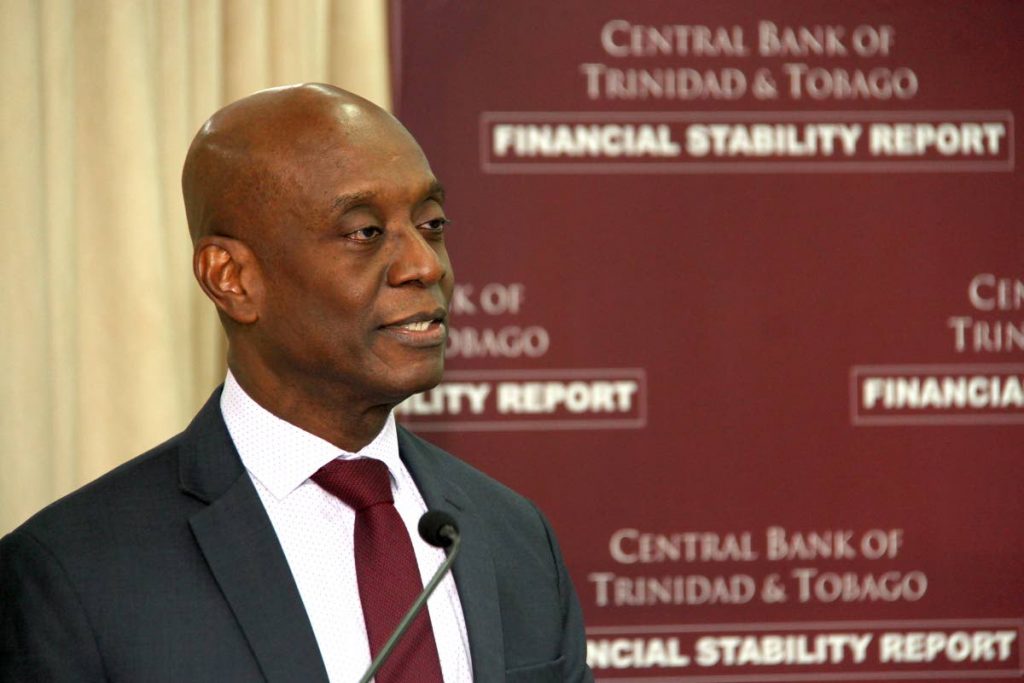'Fat' in the system

The TT dollar has depreciated against the US dollar by 6.5 per cent since September 2015, when the official selling rate was TT$6.36 to US$1 to $6.778 this past May.
The rate of inflation, counter-intuitively, has slowed significantly since then, at 4.9 per cent in the third quarter of 2015, coming all the way down to 1.3 per cent in the last quarter of 2017.
The exchange rate is the price of one country’s currency for another’s, Central Bank Governor Alvin Hilaire said at the bank’s release of the Financial Stability Report, on June 21, while inflation is the rate of increase of domestic prices. They are connected, because countries often import goods, but it’s usually a positive correlation, where as one increases so does the other.
So why the inverse relationship in TT?
“The Central Bank’s analysis shows there is a clear relationship between import prices, the exchange rate and domestic prices with a lag of about two to three months. That’s the relationship so if the exchange rate depreciates you would think that all things being equal it would affect local prices and therefore the local inflation rate,” Hilaire said.
But last year, when there was a fairly significant movement in the exchange rate, inflation didn’t adjust accordingly.
“We felt that there was still some fat in the system — their margins were so healthy that even though the exchange rate changed and it would add to cost, businesses felt that they could not pass it on because people just would not buy, or else, go to the competition.
"For that particular period when the question would be most relevant, there was no real impact of that depreciation on inflation at all because there was this huge margin so the merchants knew they could still make a profit without increasing prices," he said.
“That is quite important. We don’t know what will happen in the future but we anticipate in general there would be a positive correlation. The other thing to be aware of is the state of the economy and demand and how that impacts inflation. The more the demand, the more prices will go up. To the extent that people are laid back, inflation will be low,” he said.
Keeping inflation low has been a core argument of Government for not allowing an exchange rate adjustment. In a tweet in May, Finance Minister Colm Imbert said, “Ministry of Finance policy is to contain inflation through stability of the exchange rate while targeting forex to the productive sector and managing foreign reserves. Inflation rate in Trinidad and Tobago is now at a record low, below 2%. This low inflation is not accidental.”
As it stands, the bank is still maintaining its wait and see attitude to exchange rate adjustment, even though Hilaire has acknowledged that reserves are dipping.
In May, the country’s foreign reserves dipped below US$8 billion for the second time this year — the first was in March, when it dipped to US$7.987 billion; after a brief rebound in April to US$8.112 billion, reserves fell again to US$7.965 billion — the lowest point in a decade.
“We lost about US$500 million this year; all things being equal we may probably lose another US$500 million by the end of the year,” Hilaire said.
The country’s reserves are still “comfortable,” he added, but pointed out that high reserves are essentially buffers for rainy days, like what the country is experiencing right now. “We are using it but we will have to rebuild these reserves and be careful not to overdo our use,” he said. The bank was not worried, he said, but it was observing the situation and hoped policy would be applied in a way that would help the country rebuild buffers to weather future storms.
Asked about a possible black market, Hilaire acknowledged that there may be incentive for such an industry, but the bank does not see any evidence that is anywhere near the extent as other countries, for example, TT’s Latin American neighbours.
“We have not seen anecdotal evidence or more than anecdotal evidence of black market rates way over market rates. It is a tricky situation. Timing makes a huge difference. We do have some increase in supply in the short run that helped to some extent but for those who can’t access, it doesn’t help,” he said.
Over time, though, things need to be brought into balance, with the combination of fiscal, monetary and structural policy necessary for restoring what he calls “durable balance.”
“It is not a situation we think should persist indefinitely. It is not a sustainable situation,” he said.


Comments
"'Fat' in the system"